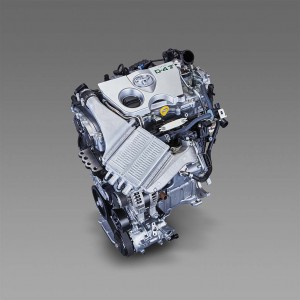Perhaps best known for its dependence on hybrid powertrains, Toyota Motor Co. is also planning a big push into turbo power, the maker announced today.
The announcement echoes moves by a wide variety of other manufacturers – with industry observers anticipating a majority of the world’s gas- and diesel-powered vehicles will use turbocharging to deliver more power and improved mileage within the next decade.
“Despite the success of hybrids, Toyota is aware that vehicles with conventional powertrains still represent the majority of vehicles sold,” said the maker in a statement out of Japan. “By constantly increasing environmental performance across its entire vehicle lineup, Toyota aims to offer a portfolio of environment-friendly vehicles that meet the diverse needs of consumers.”
Toyota’s newest turbo package, the 8NR-FTS, is a 1.2-liter direct-injection engine that will initially be offered as an option on the newly updated Auris model. The engine uses a single-scroll turbocharger with an adaptive intake cooling system to optimize exhaust temperate – which translates into improved acceleration across a wide RPM range, Toyota claims.
As with other engines, the use of turbocharging allows Toyota to opt for a smaller-displacement package that can boost performance when required but which otherwise yields improved fuel economy.
Toyota is now doubling its turbo offerings, news that comes less than a week after the Japanese giant lifted the covers on the eighth gas-electric model in its line-up, the RAV4 Hybrid, during a news conference at the New York International Auto Show.
(For more on the new Toyota RAV4 Hybrid, Click Here.)
Hybrid sales have been growing at an anemic rate, particularly as fuel prices have fallen. Demand for the best-selling Toyota Prius actually slipped last year.
On the other hand, turbo sales have been booming. Notably, during the NY Auto Show, rival Honda revealed plans to offer its new Earth Dreams turbo engine in the next-gen Civic coming later this year. Also in NY, Cadillac confirmed it will use a twin-turbo V-6 for the top-performing version of its new CT6 flagship sedan, rather than a V-8. Volkswagen has suggested it could go all turbo in the coming years for its non-electric models. Volvo is using turbos on all of its future products – including those powered by its “twin engine” gas-electric drivetrain.
(For more on the unexpected announcement Honda will launch a new Civic line for 2016, Click Here.)
Ford has been betting big on its EcoBoost family of turbocharged engines, offering them in a range of products from the little Fiesta up to the full-size F150 pickup. It is expecting to offer EcoBoost engines in 80% of its model line-up by next year. That includes a new high-performance version that is aimed to help build overseas demand for the latest-generation Ford Mustang.
Turbos are becoming especially popular on high-end and high-performance products, such as the new BMW M3 and M4 models, and even the new McLaren 570S, also introduced in New York, is using a turbo to squeeze 562 horsepower out of its 3.8-liter powerplant.
A study by leading turbo maker Honeywell forecasts that turbos will be found in nearly half of the vehicles sold worldwide by 2017, up from around 25% in 2013.
(Toyota working up major global expansion plans. Click Here for the full story.)


The fact is the majority of consumers are not going to buy hybrids and even fewer will buy impractical EVs. Thus all auto makers are forced to employ turbocharged smaller displacement engines to reduce the fines that will be imposed for not being able to meet the unrealistic pie-in-the-sky 54.5 mpg CAFE requirement that Obama and the EPA pulled from their orifice.
Smaller turbocharged engines will deliver better fuel economy but they will wear faster than a larger, less loaded engine. Consumers will pay dearly up front for Turbo engines and again after the engines wear prematurely. Exhaust emissions will actually increase once the engines wear prematurely from the heavy loads on a small engine which will require more WOT usage. Obama will be long gone by then…